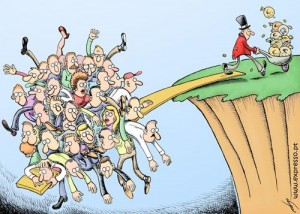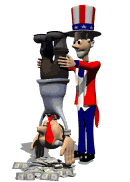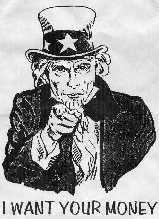The Bush Coup d'Etat
by Harry Browne
December 20, 2001
(published here)
In 1932 Franklin Roosevelt [a man whose name lives in infamy] was elected promising a 25% reduction in the federal budget, an end to deficits, and the restoration of a sound dollar.
Within eight years the federal budget tripled, federal debt increased 155%, and the gold standard was repudiated -- making the U.S. dollar a fiat currency.
Roosevelt's New Deal [what a deal !] transformed America from a unique country in which everyone could live his life as he saw fit into a welfare state in which most business was supervised from Washington.
No longer was America run by the people -- or even by Congress. Instead it was now directed by bureaucrats operating in regulatory agencies like
AAA,
FCA,
CCC,
FCI,
SMA,
FSA,
NLRB,
PWA,
WPA,
FDIC,
FSLIC,
SEC,
SSA,
REA,
TVA of 1930s, Electric Home & Farm Authority (EHFA) -- directing when we shall sow and when we shall reap.
Also, see:
Effecting a Revolution
Why would Americans give up their freedom for a system that had never worked well in the Old World?
They did it because Roosevelt never attacked the American Way head-on. Instead...
- He praised the Constitution, but said it must be updated from "horse and buggy" days.
- He never discussed the liberties he was stealing -- talking instead about government's power to do good.
- Any objectors were challenged to prove that some other program could cure the Depression perfectly overnight.
- Those who protested the loss of freedom were dismissed as alarmists and "economic royalists" who wanted to continue exploiting their neighbors.
The magic words were "recovery" and "emergency." They justified everything -- even though the New Deal produced no recovery, and there were far better ways to deal with the emergency.
The Mess of Pottage
The writer Garet Garrett called the New Deal "The People's Pottage". Esau had traded his birthright for a mess of pottage. And now the American people had traded _their_ birthright -- the freest nation the world had ever known -- for a mess of pottage.
And what did that pottage consist of?
In 1940 the unemployment rate was still 15%, the Depression was still severe, and Roosevelt was maneuvering America into war to distract attention from the New Deal's failures.
THE BUSH REVOLUTION
In 2000 George Bush won the Presidency promising "limited government," reading the Constitution literally, and rejecting the concept of "nation-building" -- the practice of imposing pro-American governments on foreign nations.
But once in office he produced a federal budget limited by nothing. And now he's making the Constitution an instrument of his own power -- even as he imposes a new government on Afghanistan.
The Last of the Bill of Rights
The Roosevelt Coup d'Etat destroyed the 9th and 10th amendments -- the ones limiting the government's functions.
The 1st and 2nd amendments remained in form -- although the Supreme Court now decides when they can be overruled by the government's "compelling interest."
Amendments 3-8 have survived, although considerably battered. But now the Bush Coup d'Etat is aimed at erasing these last restrictions on government power.
Bush wants to decide when people can:
- have a jury trial,
- be safe from cruel and unusual punishment,
- be secure against unreasonable searches and seizures, and
- be able to confront their accusers.
When the Bush New Deal is completed, the Bill of Rights will survive in name only. And you will live and breathe only by the sufferance of the all-mighty government. Your fate will be in the hands of people like George Bush, Hillary Clinton, Al Gore, Teddy Kennedy, and Strom Thurmond.
Of course, George Bush is doing this to save America.
But what is America if there's no individual liberty?
Current Federal Government Agencies with the POWER to restrict liberty and commerce. Central Planning to the MAX!
- The Central Intelligence Agency (CIA) gathers intelligence and provides national security assessments to policymakers in the United States. It acts as the primary human intelligence provider for the federal government.
- The Commodity Futures Trading Commission (CFTC) regulates commodity futures and option markets in the United States. The agency protects market participants against manipulation, abusive trade practices and fraud. Through effective oversight and regulation, the CFTC enables the markets to serve better their important functions in the nation's economy providing a mechanism for price discovery and a means of offsetting price risk.
- The Environmental Protection Agency (EPA) works with state and local governments throughout the United States to control and abate pollution in the air and water and to deal with problems related to solid waste, pesticides, radiation, and toxic substances. EPA sets and enforces standards for air and water quality, evaluates the impact of pesticides and chemical substances, and manages the "Superfund" program for cleaning toxic waste sites.
- The Federal Communications Commission (FCC) is charged with regulating interstate and international communications by radio, television, wire, satellite, and cable. It licenses radio and television broadcast stations, assigns radio frequencies, and enforces regulations designed to ensure that cable rates are reasonable. The FCC regulates common carriers, such as telephone and telegraph companies, as well as wireless telecommunications service providers.
- The Federal Election Commission (FEC) oversees campaign financing for all federal elections. The Commission oversees election rules as well as reporting of campaign contributions by the candidates.
- The Federal Energy Regulatory Commission (FERC) is the United States federal agency with jurisdiction over interstate electricity sales, wholesale electric rates, hydroelectric licensing, natural gas pricing, and oil pipeline rates. FERC also reviews and authorizes liquefied natural gas (LNG) terminals, interstate natural gas pipelines and non-federal hydropower projects.
- The Federal Maritime Commission (FMC) regulates the international ocean transportation of the United States. It is charged with ensuring a competitive, efficient, and economic ocean transportation system.
- The Federal Reserve Board of Governors is the governing body of the Federal Reserve System (frequently referred to as "the Fed"), the central bank of the United States. It conducts the nation's monetary policy by influencing the volume of credit and money in circulation. The Federal Reserve regulates private banking institutions, works to contain systemic risk in financial markets, and provides certain financial services to the U.S. government, the public, and financial institutions.
- The Federal Retirement Thrift Investment Board (FRTIB) is one of the smaller Executive Branch agencies, with just over 100 employees. It was established to administer the Thrift Savings Plan (TSP), which provides Federal employees the opportunity to save for additional retirement security. The Thrift Savings Plan is a tax-deferred defined contribution plan similar to a private sector 401(k) plan.
- The Federal Trade Commission (FTC) enforces federal antitrust and consumer protection laws by investigating complaints against individual companies initiated by consumers, businesses, congressional inquiries, or reports in the media. The commission seeks to ensure that the nation's markets function competitively by eliminating unfair or deceptive practices.
- The General Services Administration (GSA) is responsible for the purchase, supply, operation, and maintenance of federal property, buildings, and equipment, and for the sale of surplus items. GSA also manages the federal motor vehicle fleet and oversees telecommuting centers and civilian child care centers.
- The International Trade Commission (ITC) provides trade expertise to both the legislative and executive branches of government, determines the impact of imports on U.S. industries, and directs actions against certain unfair trade practices, such as patent, trademark, and copyright infringement.
- The National Aeronautics and Space Administration (NASA) was established in 1958 to run the American space program. It placed the first American satellites and astronauts in orbit, and it launched the Apollo spacecraft that landed men on the moon in 1969. Today, NASA conducts research aboard earth-orbiting satellites and interplanetary probes, explores new concepts in advanced aerospace technology, and operates the U.S. fleet of manned space shuttle orbiters.
- The National Archives and Records Administration (NARA) preserves the nation's history by overseeing the management of all federal records. The holdings of the National Archives include original textual materials, motion picture films, sound and video recordings, maps, still pictures, and computer data. The Declaration of Independence, the U.S. Constitution, and the Bill of Rights are preserved and displayed at the National Archives building in Washington, D.C.
- The National Labor Relations Board (NLRB) administers the principal United States labor law, the National Labor Relations Act. The board is vested with the power to prevent or remedy unfair labor practices and to safeguard employees' rights to organize and determine through elections whether to have a union as their bargaining representative.
- The National Transportation Safety Board (NTSB) investigates all aviation accidents in the United States, and certain major railroad and other accidents.
- The Nuclear Regulatory Commission (NRC) was established by the Energy Reorganization Act of 1974 from the United States Atomic Energy Commission, and was first opened January 19, 1975. The NRC oversees reactor safety and security, reactor licensing and renewal, radioactive material safety, and spent fuel management (storage, security, recycling, and disposal).
- The National Science Foundation (NSF) is a United States government agency that supports fundamental research and education in all the non-medical fields of science and engineering.
- The Securities and Exchange Commission (SEC) was established to protect investors who buy stocks and bonds. Federal laws require companies that plan to raise money by selling their own securities to file reports about their operations with the SEC, so that investors have access to all material information. The commission has powers to prevent or punish fraud in the sale of securities and is authorized to regulate stock exchanges.
- The Postal Regulatory Commission (PRC) was created in 1971 as the Postal Rate Commission and strengthened under the Postal Accountability and Enhancement Act enacted in December 2006. Provides regulatory oversight over the activities of the United States Postal Service.
- The Selective Service System (SSS) is an independent federal agency operating with permanent authorization under the Military Selective Service Act (50 U.S.C. App. 451 et seq.). It is not part of the Department of Defense; however, it exists to serve the emergency manpower needs of the Military by conscripting untrained men, or personnel with professional health care skills, if directed by Congress and the President in a national crisis. Its statutory missions also include being ready to administer an alternative service program, in lieu of military service for men classified as conscientious objectors.
- The Small Business Administration (SBA) was created in 1953 to advise, assist, and protect the interests of small business concerns. The SBA guarantees loans to small businesses, aids victims of floods and other natural disasters, promotes the growth of minority-owned firms, and helps secure contracts for small businesses to supply goods and services to the federal government.
- The Social Security Administration (SSA) is the United States federal agency that administers Social Security, a social insurance program consisting of retirement, disability, and survivors' benefits. To qualify for these benefits, most American workers pay Social Security taxes on their earnings; future benefits are based on the employees' contributions.
- The Surface Transportation Board (STB) was created in the ICC Termination Act of 1995 and is the successor agency to the Interstate Commerce Commission. The STB is an economic regulatory agency that Congress charged with resolving railroad rate and service disputes and reviewing proposed railroad mergers. The STB is decisionally independent, although it is administratively affiliated with the Department of Transportation.
- The United States Postal Service is defined by statute as an "independent establishment" of the federal government, which replaced the Cabinet-level Post Office Department in 1971. The Postal Service is responsible for the collection, transportation, and delivery of the mails, and for the operation of thousands of local post offices across the country. It also provides international mail service through the Universal Postal Union and other agreements with foreign countries.
- Other independent agencies: the National Credit Union Administration (NCUA), the Consumer Product Safety Commission (CPSC), and the Consumer Financial Protection Bureau (CFPB) (formally part of the Federal Reserve Board).
Former Agencies
|
Effecting Revolution II
Like Roosevelt, George Bush isn't attacking the Constitution and the American way head-on. Instead . . .
- He claims to want to preserve the Constitution, but says we must put security first.
- He diverts attention from our lost liberties by talking about ridding the world of evil-doers.
- Objectors are challenged to provide another program that can destroy terrorism perfectly.
- Those protesting the lost liberties are dismissed as unpatriotic, paranoid, or "America-haters" -- who are aiding the terrorists by "scaring peace-loving people with phantoms of lost liberty."
The magic words are "security" and "emergency." They justify everything -- even though Bush is _increasing_ the world domination that made us vulnerable to terrorism in the first place.
If George Bush were a Democrat, many conservatives would be fighting him to the death. But too many conservatives have abandoned their principles and begun deciding right and wrong on the basis of party labels.
More Pottage
We, too, are trading the last remnants of America for a mess of pottage.
The War on Terrorism has no more chance to succeed than the New Deal, the War on Drugs, the War on Poverty, or the War on Illiteracy.
The first revolution for big government was effected by a man who railed against big government and said he wanted to save capitalism. The second revolution is being engineered by a man who claims to be for limited government and the preservation of freedom.
Even as he seeks to destroy the last vestiges of a free America.
|
Harry Browne was Director of Public Policy for the American Liberty Foundation. You can read more of his articles at HarryBowne.org, his books are available at HBBooks.com, and you could have participated in his weekly radio talk show via the Internet every Friday evening at 9:00 pm Eastern Time at AmericanLibertyFoundation.org radio.
|
|



